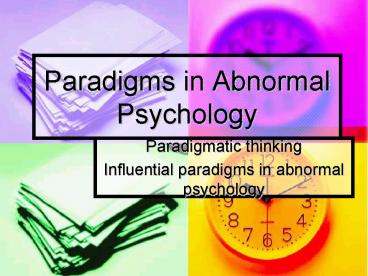Paradigms in Abnormal Psychology - PowerPoint PPT Presentation
1 / 16
Title:
Paradigms in Abnormal Psychology
Description:
Neuroscience. Psychoanalytic. Cognitive-Behavioral. Diathesis-Stress. Biological paradigms: Genetic and neuroscience. Somatogenic: Medical or disease model ... – PowerPoint PPT presentation
Number of Views:498
Avg rating:3.0/5.0
Title: Paradigms in Abnormal Psychology
1
Paradigms in Abnormal Psychology
- Paradigmatic thinking
- Influential paradigms in abnormal psychology
2
What is a paradigm?
- A pattern of thinking which induces bias
- A conceptual framework for analysis of
observations (Kuhn) - A set of assumptions that govern our observation
processes and analyses - A set of rules that a group of researchers follow
in observation and analysis
3
The influence of paradigms
- The Langer Abelson (1974) study
Applicant
4
Five key paradigms in psychopathology
- Genetic
- Neuroscience
- Psychoanalytic
- Cognitive-Behavioral
- Diathesis-Stress
5
Biological paradigms Genetic and neuroscience
- Somatogenic Medical or disease model
- Behavior genetics
- Genotype and phenotype
- Family studies Probands and relatives
- Twin studies MZ and DZ
- But are they monochorionic? Is the environment
for MZ twins really equal? - Adoptees method
- Linkage analysis What genes are involved?
- Neurochemistry
- MAOA deficiency, abuse, and violence
6
The psychoanalytic paradigm
- 1. Psychogenic
- 2. Focuses on development of mental structures
and behavior patterns - The executive model of structure
- The psychodevelopment model of pattern
7
More on psychoanalysis
- 3. Emphasizes role of intrapsychic conflict in
psychodynamics of mental illness Neurotic
anxiety and defenses
8
Contributions of psychoanalysis
- Childhood experiences may affect us as adults.
- Some of our motivations are unconscious.
- We sometimes use defense mechanisms.
- Etiology is not always obvious.
9
Cognitive-Behavioral paradigms Learning
- Focus on environmental influences and observable
behavior Behaviorism - Three models
- Classical/Pavlovian conditioning
- Operant/instrumental conditioning
- Modeling/observational learning
- Minimizes biological and cognitive factors,
normalizes behavior - But cognitive behavior therapy combines learning
and cognitive paradigms
10
More cognitive paradigms
- Psychogenic, with allowance for environmental
influence - Emphasize the role of schemas
- Are cognitions causes or effects in mental
disorders? - Social learning theory and Rational Emotive
Behavior Therapy combine cognitive and learning
paradigms.
11
Coping with paradigms
- Selection method
- But each may be right and wrong Frankl
- Integrative method
- Diathesis-stress paradigm
- Eclectic method
12
Social Issue 1 What causes mental disorders?
- What does the historical record tell us?
- What does each of the paradigms tell us?
- What does our own cultural experience tell us?
- What is your paradigm?
13
David Seamands special etiology
- Many years ago I was driven to the conclusion
that the two major causes of most emotional
problems among evangelical Christians are these
the failure to understand, receive, and live out
Gods unconditional grace and forgiveness and
the failure to give out that unconditional love,
forgiveness, and grace to other people(quoted
in Yancey, 1997, p.15
14
Lewis Smedes
- ...Three common sources of crippling shame
- Secular culture
- Graceless religion
- Unaccepting parents (quoted in Yancey, 1997, p.36
15
Paul Tournier, Guilt and Grace
- I cannot study this very serious problem of
guiltwithout raising the very obvious and tragic
fact that religion--my own as well as that of all
believers--can crush instead of liberate. - ancient sins
- unconfessable sins
- ungrace, or judgment
16
Frankl on paradigms































